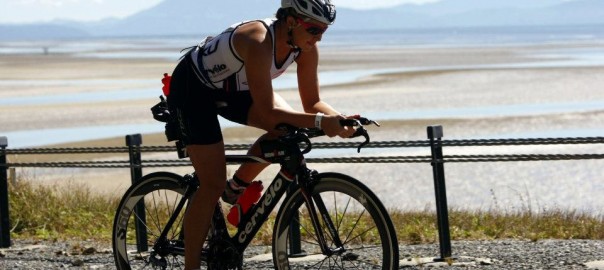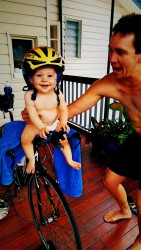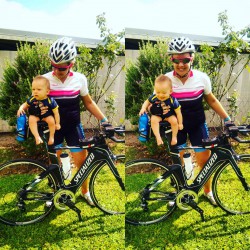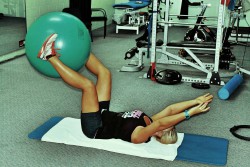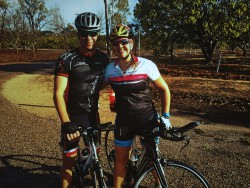As I write this I am now 4 weeks out from Ironman New Zealand. Which means that most of the big sessions are now in the bank, the mental preparation has been done, and the main part of what’s left is just getting excited to actually race soon! It will be almost 3 years since I last lined up for an Ironman, with a lot of water under the bridge in that time. This time around my goals are completely different: to finish an Ironman one year after my son was born. The training has reflected that with less focus on performance, more focus on efficiency and creativity – trying to get the quality sessions done around being a new mum and running a business (not easy but do-able). I’m aiming to get to the finish happy, healthy and with the ultimate prize at the finish line – seeing my baby boy Jude with my husband Patrick waiting for me.
I must say it’s been a super fun lead up and I’ve been really lucky to have an awesome crew to train with. I’ve accidentally convinced one of the guys I ride with to sign up for his first Ironman (go Pete!), which has gotten me thinking about back when Pat and I did our first Ironmans. I also get asked a lot of questions from my patients about how I manage the training around family and work, how I stay motivated, and what Ironman training involves. I love to talk, so I’m more than happy to share some pearls of wisdom that I have learnt along my Ironman journey so far – which has included both tremendous highs and momentous f#ck-ups. I’ll never “know it all” and that’s what I love about the sport – it’s ever changing and always challenging!
Ironman is Not Normal, and You are Not Superhuman…
…But in order to finish one, you need to get yourself to a point mentally and physically where the Iron distance seems “normal”, and your body is “scary fit” – that is, on any given day, you could bust out a 4km swim, 180km bike, and a marathon if you had to. So while on a more objective level Ironman isn’t “normal”, you should surround yourself with people who encourage you, have faith in you, and even better – have done it themselves. Avoid people who tell you how “crazy” or “impossible” it is, especially in the month before the race….and in the same spirit, maybe don’t tell every person you run into on the street that you are in Ironman training (unless you do want that negative reinforcement time and time over…plus let’s be honest, not everyone wants to hear about it).
I’ll never forget last time we did NZ Ironman, we were on the flight over and I found a documentary on this marathon runner on the in-flight entertainment list. I start watching it, and the theme of the whole thing was along the lines of being super dramatic about “how epic the marathon distance is, and how the training is the hardest thing you could ever face” and so on. Needless to say I had a chuckle and then turned it off – we were flying towards a race in which we were going to do a marathon AFTER swimming 4 km and riding for 180 km, on hills no less. We had spent the last several months mentally getting to a point where that was not only OK but appealing, so I didn’t need to hear about how hard the marathon is in great detail…
Final note on the Scary Fit phenomenon: it does not mean you are Superhuman. If you do stupid things, you will still break (see my previous post on Busso Ironman 2012 – “The Upside of Injury”). Super Fit is good; Super Stupid is not. Respect your body, be nice to it, and build into things gradually and with consistency.
Make a Priority List….And Stick to It
Mine goes like this:
1) My husband and baby boy
2) Running our Physio Clinic
3) & 4) Ironman training and Social Life.
The last two are tied because I sway between the two. The priority list becomes super important when you get to those tough decisions during the training block: you have a long run scheduled but you also have an invite for breakfast with girlfriends; or it’s your husband’s birthday on a Sunday when you have a 5 hour ride planned and a 3km swim with several hours of exhausted-getting-your-sh#t-together time in between the two. The priority list is important to help you decide when you should change the plan, so that you can get to race day and not only be fit but also still have a marriage, a child who knows your name, a business that’s still functioning and friends to tell you how awesome you are for finishing an Ironman. You may think I’m joking here but you would not believe how many Ironman athletes I know who can pull out amazing race times but are unhappy in every other aspect of their lives. A bit of perspective and some smart decisions go a very long way. Most Ironman athletes by their very nature (myself included) are very “Type A” control freaks; learning to be a bit more flexible with fitting training around your life and relationships (not the other way around) is key to getting it done and still being happily married at the finish line.
Involve Your Family and Friends – it’s supposed to be FUN
Following on from the above point – I try to combine points 1, 3 and 4 by training with my husband and friends where possible, and if we get really creative, our baby boy Jude as well (usually for part of a long run in the Mountain Buggy). I have a Cycling Wife (thanks Carly) plus a bunch of guys who are always keen to come for part or all of my long rides (I’m talking 4-5 hours on the road). I do think that for newbie Ironman athletes, it’s important to do some of the big sessions on your own to ‘get into your own head’ – more as a confidence thing to prepare to do it on race day – but I don’t think it’s healthy to be doing all of your sessions on your own.
There’s a tradition in Ironman to go back to the finish line after you’ve done your race to cheer on the rest of the athletes and bring them home. You have up to 16 or 17 hours (depending on the race) to get the distance done. I always say that everyone should experience an Ironman finish line at least once in their life – even if it’s just watching the athletes finish. Watching the emotions of the age group athletes as they come down that finish chute after what’s likely been the hardest physical and mental thing they’ve ever done, hugging their husband or wife and crying with tears of happiness, pride, relief, joy…. In a world where we are bombarded with negative news stories and surrounded by obesity and chronic diseases, it’s heartwarming to be reminded of what the human body and mind is capable of doing when it is treated well. It’s a sight you will never forget, and it’s one of the many reasons why we will continue to travel away to triathlons as Jude grows up – so that he too can be surrounded by such an uplifting and inspiring group of people doing extraordinary things as a reminder of how positive life can be. Personally, I found watching my husband finish his first Ironman far more emotional than finishing my own first Ironman (and it still makes me teary thinking about it). There’s something special about being on that journey together. Race day is the celebration, but there’s a lot of hours of training that happen in the lead up, and involving your loved ones makes it so much more special.
Reality Check: Lower Your Standards
You can pick up any fitness magazine these days and they’ll have you believe that not only is Ironman achievable, it’s even easy – it must be, since every Tom, Dick and Harry is doing one now (Men’s Health Magazine and Triathlete I am talking to you). Not only that, but the Holy Grail of landing a Kona spot (ie qualifying for the world championships) should be on your “goals” list now too, apparently.
What these magazines fail to address is the reality of the Age Group Ironman World: lots of unhappy marriages; lots of athletes running away from something in their lives or having a mid life crises and training 30 hours a week, or worse – the newbies that sign up and never make it to the start line because the training alone leaves them broken and disillusioned.
Be clear on your goals, and see the situation for what it is: if you are considering doing your first Ironman, just aim to get to the finish line HAPPY and HEALTHY. Full stop. The athletes that qualify for Kona are insanely talented and spend upwards of 20 hours a week year in, year out training for that right. They will be at the finish line not long after the Professional Ironman Athletes are. Forget about everyone else racing; just set your own goals, focus on enjoying the journey, and allow yourself to be proud of your efforts. Less than 1% of the world’s population will ever finish an Ironman; you should be proud of that, no matter what the finish time is.
The Serious Stuff: Get a Good Coach (+ Dietician + Physio)
OK I’m a Physio so I can’t help myself: I am always mystified by people who are willing to drop 6k on a bike, 1k on race entry, god knows how much on travel, accommodation etc….and won’t invest any money at all in a coach, let alone a good one (yes, just like anything you get what you pay for with coaching). Trust me on this one: you will get way more confidence, speed, fitness and less injuries if you have a decent coach as compared to a decent bike. A new time trial bike might make you look super fast but the joke’s on you when the old ladies on their road bikes start passing you in the second half of the bike leg (I’m not joking…). I’ve had the same coach for the last 5 years: he knows my body; knows how to handle me; when to push and when to back off. Doing an Ironman without him guiding the process would feel like trying to swim without my right arm. Triathlon is an expensive sport but you can spend money wisely to get the most out of your journey.
On a similar note, it’s worth spending the money on seeing a good sports dietician and a physio before you start your big training block. This is particularly important if you have any injury history, or if you are looking to alter your body composition and get advice on race day nutrition and how to train that aspect of the race. If you go out there and start downing Gu’s for the first time on race day you will spend more time in the port-a-loos than on the bitumen; there’s a reason they call nutrition the “fourth discipline” of triathlon. Your body can store about 90 minutes worth of glycogen for exercise, so the nutrition plan becomes super important if you want to race for upwards of 12 hours and finish in one piece. A Physio can help with bike set up, core work and screening for injury risk so that you can strengthen up before an injury derails you.
If you have goals of doing a triathlon or even an Ironman one day but don’t know where to start, don’t hesitate to reach out to one of us and have a chat – or even better, come along for one of our group runs or rides. We can help guide you with your training (see our Bio on Ironman coach (and my coach) Scott DeFilippis on our home page) as well as your injury prevention plan, bike set up, dietician referral, sports nutrition products and much more (we stock Gu nutrition products at First In Physio).
Thanks for reading and as always, Happy Training! You can follow the final weeks of my journey to NZ Ironman on Instagram @KRISTY_SHANNON – I’d love to heave you along for the ride. Thanks to everyone who has reached out already, it really means a lot to have your support along the way. Race day is the 5th March, 2016.
Kristy Shannon
Director and Principal Physiotherapist
First In Physio

